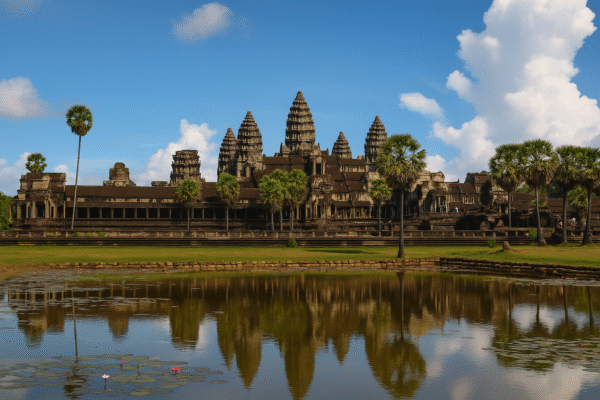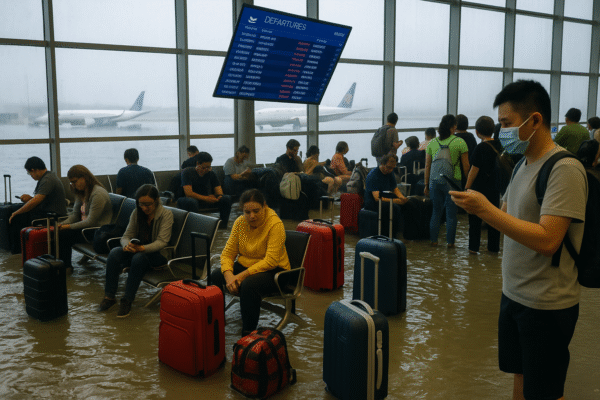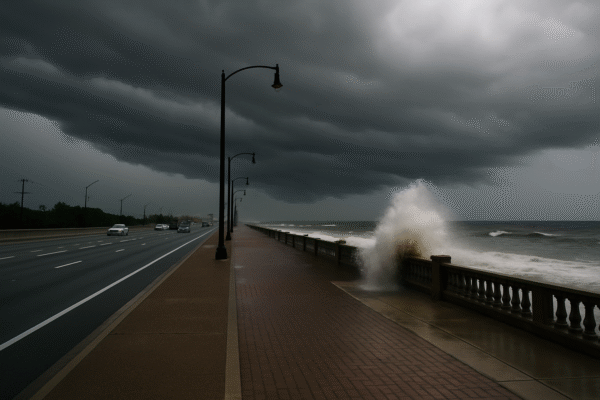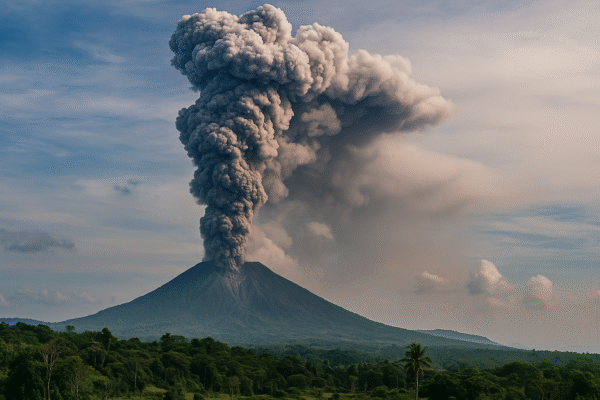Travellers planning to visit Indonesia are being strongly urged to monitor local advisories and airline alerts after Mount Lewotobi Laki-Laki erupted violently on June 17, 2025, triggering the country’s highest-level volcanic alert. Located in the island province of East Nusa Tenggara, the volcano sent an ash column soaring 11 kilometres into the sky, severely impacting regional air travel and prompting emergency evacuations in nearby villages.
The eruption marks the most significant volcanic activity from Lewotobi in recent years, reinforcing Indonesia’s position within the seismically active Pacific Ring of Fire. The country’s Geological Agency confirmed that the volcano displayed “abnormal escalation in intensity,” with dense grey ash clouds rising more than 10,000 metres, surpassing typical daily activity recorded in the region.
Travel Disruptions: Flights Cancelled and Delayed
Tourists and business travellers alike are facing major flight delays and cancellations as a result of the ash cloud drifting across air corridors. While Ngurah Rai International Airport in Bali (DPS) remains operational, several international and domestic carriers have announced temporary flight suspensions or significant schedule disruptions.
Airlines impacted include:
- Jetstar Airways
- Virgin Australia
- Air India
- Air New Zealand
- Singapore’s TigerAir
- China’s Juneyao Airlines
Jetstar released a statement noting: “Forecasts show the ash cloud is expected to clear by later tonight. As a result, this afternoon’s flights will be delayed to operate later this evening.”
Additionally, domestic flights operated by AirAsia en route to Labuan Bajo on Flores Island were grounded. An AirAsia representative at Bali Airport told AFP that operations were proceeding with caution, but multiple scheduled departures had been scrubbed to ensure passenger safety.
Volcano Safety Measures for Travellers
Indonesian authorities have issued an exclusion zone extending up to 8 kilometres around the Lewotobi Laki-Laki crater. Local villages have already begun evacuation procedures, with one settlement completely vacated due to dangerous ashfall that blanketed homes and vegetation in thick grey-orange dust.
Travelers in the region are advised to:
- Avoid trekking or visiting active volcanic areas
- Wear N95 masks or suitable face coverings to prevent inhalation of fine ash particles
- Monitor updates from Indonesia’s National Disaster Management Authority (BNPB) and airport advisories
- Prepare for sudden changes in travel plans, including overnight delays or alternate transport arrangements
Tourists currently near Mount Lewotobi, especially those engaging in adventure tourism on Flores Island, are urged to reconsider any off-grid excursions and comply with guidance issued by local disaster management officials.
Why This Matters for Global Travelers
Indonesia is a magnet for international travellers, with its diverse landscapes, volcano hiking routes, and eco-tourism offerings. However, the eruption of Mount Lewotobi Laki-Laki is a stark reminder of the country’s natural volatility. The volcano’s current status is “Level IV – Awas (Alert)”, the highest in Indonesia’s 4-tier alert system.
Indonesia has more active volcanoes than any other country in the world, with over 120 classified as active. Lewotobi itself is a twin-peaked volcano, comprising Lewotobi Laki-Laki (the “male” volcano) and Lewotobi Perempuan (the “female” volcano). The male peak has historically been the more active, with the 2025 eruption standing out due to its massive ash discharge and immediate disruption of tourism infrastructure.
Alternative Destinations: Explore Nearby Sumba Island
For travellers forced to alter their itinerary, nearby Sumba Island in East Nusa Tenggara offers a scenic and culturally rich alternative. Known for its untouched beaches, megalithic villages, and vibrant weaving traditions, Sumba is accessible via ferry or air from unaffected hubs.
Tour operators are now pivoting their packages to highlight safer, lesser-known attractions across the Indonesian archipelago while monitoring ongoing volcanic activity. Eco-lodges and coastal retreats in Sumba are welcoming stranded or redirected tourists with open arms and discounted stays.
Final Travel Tips and Resources
If you’re in Indonesia or planning to travel in the coming days:
- Check your airline’s real-time flight status
- Follow @BNPB_Indonesia on social media for latest alerts
- Download the MAGMA Indonesia app, a reliable government-supported tool for volcanic activity updates
- Stay in touch with your embassy, particularly if you’re travelling from Australia, New Zealand, Singapore, India, or China
As of now, no fatalities or injuries have been reported, but local authorities continue to monitor the situation closely, with volcanic tremors and gas emissions persisting.
Read more travel alerts, follow Global Travel Wire.
Disclaimer:
This image is AI-generated and created for illustrative purposes only. It may not accurately represent the actual events, individuals, or locations described in the news article.

















